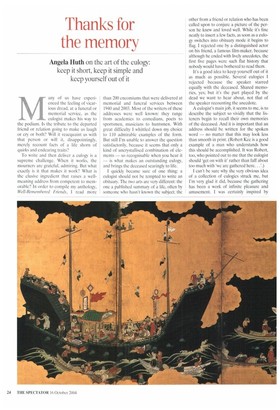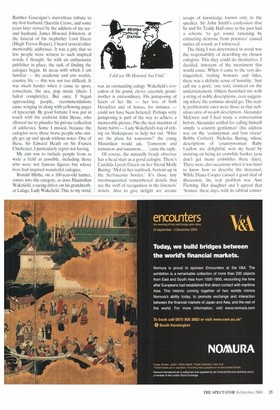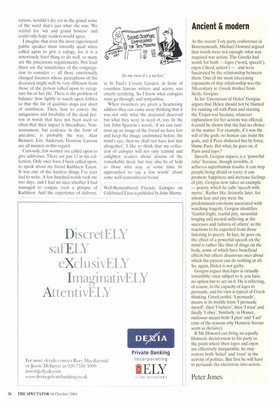Thanks for the memory
Angela Huth on the art of the eulogy: keep it short, keep it simple and keep yourself out of it Many of us have experienced the feeling of vicarious dread, at a funeral or memorial service, as the eulogist makes his way to the podium. Is the tribute to the departed friend or relation going to make us laugh or cry or both? Will it reacquaint us with that person or will it, disappointingly, merely recount facts of a life shorn of quirks and endearing traits?
To write and then deliver a eulogy is a supreme challenge. When it works, the mourners are grateful, admiring. But what exactly is it that makes it work? What is the elusive ingredient that raises a wellmeaning address from competent to memorable? In order to compile my anthology, Well-Remembered Friends, I read more than 200 encomiums that were delivered at memorial and funeral services between 1940 and 2003. Most of the writers of these addresses were well known: they range from academics to comedians, poets to sportsmen, musicians to huntsmen. With great difficulty 1 whittled down my choice to 110 admirable examples of the form. But still I'm unable to answer the question satisfactorily, because it seems that only a kind of uncrystallised combination of elements — so recognisable when you hear it — is what makes an outstanding eulogy, and brings the deceased searingly to life.
I quickly became sure of one thing: a eulogist should not be tempted to write an obituary. The two arts are very different: the one a published summary of a life, often by someone who hasn't known the subject; the other from a friend or relation who has been called upon to conjure a picture of the person he knew and loved well. While it's fine neatly to insert a few facts, as soon as a eulogy switches into obituary mode it begins to flag. I rejected one by a distinguished actor on his friend, a famous film-maker, because although he ended with lively anecdotes, the first five pages were such flat history that nobody would have bothered to read them.
It's a good idea to keep yourself out of it as much as possible. Several eulogies rejected because the speaker starred equally with the deceased. Shared memories, yes; but it's the part played by the dead we want to hear about, not that of the speaker recounting the anecdote.
A eulogist's main job, it seems to me, is to describe the subject so vividly that the listeners begin to recall their own memories of the deceased. And it is important that an address should be written for the spoken word — no matter that this may look less than smooth in print. (Robert Kee is a good example of a man who understands how this should be accomplished. It was Robert, too, who pointed out to me that the eulogist should 'get on with it' rather than faff about too much with 'we are gathered here. . .'.) I can't be sure why the very obvious idea of a collection of eulogies struck me, but I'm very glad it did, because the gathering has been a work of infinite pleasure and amusement. I was certainly inspired by
Bamber Gascoigne's marvellous tribute to my first husband, Quentin Crewe, and some years later moved by the address of my second husband, James Howard Johnston, at the funeral of his stepfather Lord Dacre (Hugh Trevor-Roper). I heard several other memorable addresses. It was a pity that so few people were witness to such inspired words, I thought. So with an enthusiastic publisher in place, the task of finding the eulogies began. In areas with which I am familiar — the academic and arts worlds, country life — this was not too difficult. It was much harder when it came to sport, comedians, the sea, pop music (there I failed completely). But once I began approaching people, recommendations came winging in along with yellowing pages of typescript. By good fortune I was put in touch with the archivist John Byrne, who allowed rue to plunder his private collection of addresses. Some 1 missed, because the eulogists were those brave people who simply get up and speak without notes. One of these, Sir Edward Heath on Sir Francis Chichester, I particularly regret not having.
My aim was to include people from as wide a field as possible, including those who were not famous figures but whose lives had inspired wonderful eulogies.
Ronald Blythe, on a IOU-year-old farmer, comes into this category, as does Maximilian Wakefield, a racing driver, on his grandmother Lalage, Lady Wakefield. This, to my mind,
was an outstanding eulogy: Wakefield's evocation of his grand, clever, eccentric grandmother is extraordinary. His juxtaposing of facets of her life — her love of both Heraclitus and of horses, for instance — could not have been bettered. Perhaps witty juxtaposing is part of the way to achieve a memorable picture. Plus the neat insertion of funny habits — Lady Wakefield's way of relying on Shakespeare to help her out. 'What are the plans for tomorrow?' the young Maximilian would ask. 'Tomorrow and tomorrow and tomorrow. came the reply.
Of course, the naturally beady observer has a head start as a good eulogist. There's Candicla Lycett Green on her friend Molly Baring: 'Mol in her sunfrock, bottom up in the herbaceous border.' It's those tiny inconsequential remembered details that are the stuff of recognition in the listeners' minds. Also to give delight are arcane scraps of knowledge known only to the speaker. Sir John Smith's confession that he and Sir Teddy Hall once in the past had a scheme 'to get round rationing by extracting dextrose from potatoes' caused smiles all round, as I witnessed.
The thing I was determined to avoid was the responsibility of describing my chosen eulogists. This they could do themselves, I decided, innocent of the merriment this would cause. When it came to the very distinguished, trailing honours and titles, there was a definite sense of humility. 'Just call me a poet,' one said, insistent on the understatement. Others furnished me with a string of noble descriptions, even suggesting where the commas should go. The really problematic ones were those in that nebulous area of no-job description. Alexander Mcliwen and I had many a conversation before Alexander settled for calling himself simply 'a country gentleman' (his address was on the 'countryman and bon viveur' Bobby Corbett). Nicholas Baring, whose descriptions of 'countrywoman' Ruby Ludlow are delightful, won my heart by insisting on being an erstwhile banker (you don't get many erstwhiles these days). There were also occasions when it was hard to know how to describe the deceased. While Diana Cooper caused a good deal of discussion, the real problem was Ann Fleming. Her daughter and I agreed that 'hostess' these days, with its tabloid conno
tations, wouldn't do; yet in the grand sense of the word that's just what she was. We settled for `wit and grand hostess' and could only hope readers would agree.
I imagine that even the most experienced public speaker must inwardly quail when called upon to give a eulogy, for it is a notoriously hard thing to do well, so many are the precarious requirements. Not least there are the sensitivities of the congregation to consider — all those emotionally charged listeners whose perceptions of the deceased might well be very different from those of the person called upon to recapture his or her life. There is the problem of balance: how lightly to touch upon foibles so that the list of qualities stops just short of saintliness. Then, how to convey the uniqueness and lovability of the dead person in words that have not been used so often that their impact is threadbare. Nonassessment, but evidence in the form of anecdote, is probably the way. Alan Bennett, Eric Anderson, Dominic Lawson are all masters in this regard.
Curiously, few women are called upon to give addresses. There are just Ii in my collection. Only once have I been called upon, to speak about my friend Kathleen Tynan. It was one of the hardest things I've ever had to write. A few hundred words took me two days, and I had no idea whether I had managed to conjure even a glimpse of Kathleen. And the experience of delivery, in St Paul's Covent Garden, in front of countless famous writers and actors, was utterly terrifying. So I know what eulogists must go through, and sympathise.
When mourners are given a heartening address they can come away thinking that it was not only what the deceased deserved hut what they were in need of, too. In the late John Sparrow's words, 'if we can summon up an image of the friend we have lost and keep the image undimmed before the mind's eye, then we shall not have lost him altogether'. I like to think that my collection of eulogies will not only remind and enlighten readers about dozens of the remarkable dead, but may also be of help to those who may at some time he approached to 'say a few words' about some well-remembered friend.
Well-Remembered Friends: Eulogies on Celebrated Lives is published by John Murray.












































































































 Previous page
Previous page